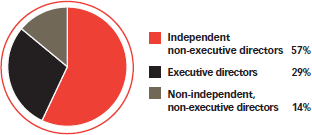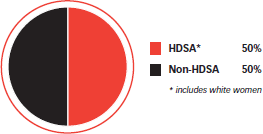![Harmony [logo]](i/logo.png)
![Harmony [logo]](i/print_logo.png)
- Home
- About this report
- Governance and economic performance
- Social performance
- Environmental performance

Key feature
- Adoption of an integrated approach to reporting
- Home <
- Governance and economic performance <
- Governance of sustainability
Governance of sustainability
Material governance indicators
Harmony has identified five primary areas of focus in respect of governance, namely:
- Compliance with legislation in the countries in which the company operates.
- Implementation of good practice in respect of governance and reporting.
- Establishment and maintenance of board and company structures so as to uphold the rights and interests of stakeholders and to report thereon.
- Ensuring integrity and ethics in all aspects of the business.
- Ensuring appropriate levels of risk management and mitigation.
See the section on Harmony's approach to sustainability reporting to find out how we identified our material issues.
Compliance with legislation
Harmony has a solid governance structure and has put measures in place to ensure compliance with legislation and regulations in the countries in which it operates and in line with the stock exchanges on which the company is listed. A detailed discussion of Corporate governance may be found in the Annual Report.
There were no significant fines paid by the company in any of its areas of operation in FY10, and no actions were brought against the company in respect of anti-competitive behaviour, anti-trust or monopoly practices. A total of 29 Section 54 suspensions were issued by the DMR for the cessation of operations at company operations during the year, the majority of which were at the Kusasalethu (7), Joel (4) and Phakisa (4) operations.
Governance practices and reporting
Harmony is committed to applying and upholding the highest corporate governance practices. In line with its primary listing on the JSE Limited (JSE) in South Africa, its disclosure practices and policies are guided in the first instance by the South African Companies Act, the JSE regulations and the King Report on Corporate Governance 2002 (King II). Harmony is currently implementing the guidelines advocated in King III.
Harmony also complies with the regulations of other exchanges on which it is listed, as well as of the United States Securities and Exchange Commission (SEC) and of the Public Company Accounting Reform and Investor Protection Act of 2002, more commonly referred to as the Sarbanes-Oxley Act of 2002 (Sox).
Harmony has adopted an integrated approach to reporting for its 2010 Annual and Sustainability Development reports, which combines financial and non-financial reporting. King II recommends the Global Reporting Initiative (GRI) guidelines and this Sustainable Development Report has been developed in alignment with the requirements both of King II and of GRI. The group is intent on reviewing and implementing the King III guidelines in the coming financial year.
Engaging with shareholders and employees
Harmony encourages ongoing interaction with stakeholders at all levels, including shareholders.
Harmony has, through both formal and informal processes, identified its stakeholders as:
- Shareholders.
- Employees and employee representatives.
- National, regional and local government, and regulators.
- Industry organisations, such as the Chamber of Mines.
- Customers and suppliers.
- Partners.
- Host communities.
- Media and analysts.
- Non-governmental and community-based organisations.
- General public.
Stakeholder engagement is the responsibility of line management and not the remit of any one individual or department. Support is provided by centralised functions both at a group and operational level for specific stakeholders, such as the financial community, employees and unions, communities and regulatory authorities. An account of the frequency of interaction and the specific issues raised is not maintained at a corporate level, and is the responsibility of the operations. Where specific issues have become of material concern, they are then raised at a group level (for example, relations with NGOs and community members in PNG, or in the development of local economic development projects in South Africa).
Effective and ongoing communication with shareholders is seen as a function of the group’s responsibility to inform shareholders of the company’s value proposition. Harmony holds results presentations each quarter to announce the company’s results. Shareholders and other interested parties around the globe are able to view the presentation via a live webcast that is available on the website. Harmony’s management team participates in various institutional conferences and roadshows, both locally and internationally, at which management engages with current and potential investors at either one-on-one meetings or at corporate presentations.
Shareholders are encouraged to attend the Annual General Meeting, where they are requested to take resolutions on company matters. Harmony’s website is also a valuable source of information for shareholders and other company stakeholders. There were no significant issues raised by shareholders in FY10.
Governance and company structures
Specific attention is given to sustainability by the board through the functioning of the Sustainable Development Committee, which is chaired by an independent non-executive director Mr Modise Motloba. The role of the Sustainable Development Committee is to supplement, support, advise and provide guidance on the effectiveness or otherwise of management’s efforts in respect of sustainable development. The committee considers the following sustainable development issues: occupational health, safety, HIV & AIDS, social investment and environmental management.
The Sustainable Development Committee has three members and met on four occasions in FY10. The chief executive officer and executive managers are invited to attend these meetings. The committee undertakes site visits as part of its investigations and reviews. Site visits were undertaken to the Joel and Tshepong operations in the Free State in September 2009.
Given the requirements of legislation in South Africa, Harmony also has in place an Empowerment Committee. This committee ensures that the company not only meets the regulations stipulated in the Employment Equity Act, the Labour Relations Act, the Mineral and Petroleum Resources Development Act (MPRDA) and the Mining Charter, but also fulfils the company’s own empowerment imperatives. The committee is chaired by an independent non-executive director, Mr Joaquim Chissano, and the chief executive officer and several executive managers are invited to attend meetings. The committee met on four occasions in FY10.
Ultimately, however, the responsibility for the performance of the company and the objectives that are set lies with the board of directors, and sustainable development and empowerment are standard agenda items at board meetings.
Board composition
Harmony has paid specific attention to the composition of the board to ensure that it is reflective of the objectives set by the company and is thus sustainable. These include:
- Representation by historically disadvantaged South Africans (HDSAs) and women. Two of Harmony’s non-executive directors are women, and five directors are drawn from groups considered to be HDSAs. Harmony takes cognisance of the gender and racial mix of the board in considering new appointments.
- The board considers individual and group performance when considering the remuneration of executive management including that of non-financial indicators - social and environmental performance. Particularly accountable for performance in these areas are members of the Empowerment Committee and of the Sustainable Development Committee.
- The board’s performance as well as that of its committees is evaluated on an annual basis. In FY10 a board self-assessment exercise was carried out by external consultant, KPMG, for the second consecutive year through a questionnaire completed by each board member. A full report based on the findings of this evaluation will be circulated to the board.
Composition of the board - 30 June 2010


Support for external initiatives
Harmony is highly influenced by public policy both locally and internationally and as such is increasingly involved in participating in and influencing government policy, either directly or through the Chamber of Mines, as well as in lobbying with Eskom and the National Energy Regulator of South Africa (Nersa) on issues such as security, supply and cost of electricity and potential carbon taxes.
In FY10 Harmony, directly and through the Chamber of Mines, actively participated in processes reviewing issues regarding the following key mining legislation:
- Housing and Living Conditions Standard;
- Codes of Good Practice for the Minerals Industry; and
- Revisions to the Mining Charter.
Through the Chamber of Mines, Harmony continuously participates in and provides input on public policy development especially on legislative issues that have an impact on or govern the mining industry. The company also lobbies on environmental legislative reform such as the inclusion of mining environmental management in the Department of Water & Environmental Affairs (DWEA); changes to financial provision guidelines; and the Waste Management Act. Harmony has participated in the Wonderfontein Spruit Catchment group through the Mining Industries Group, by finalising and implementing the recommendations of the Remedial Action Plan (RAP) report - an initiative between government, industry and civil society focusing on the remediation of the Wonderfontein Spruit.
Integrity and ethics
Harmony’s Code of Ethics (PDF – 19KB) commits the company, its employees and its contractors to adhere to a set of values so as to ensure the adoption of the highest ethical standards and to ensure that they are free of conflicts of interest. These values include transparency, trust, accountability, respect, equality and responsibility.
An Ethics Committee meets on a quarterly basis to monitor ethical behaviour within Harmony’s business environment, ensures that the Code of Ethics is distributed to and signed by all employees and assesses the reports received from the White Collar Crime Committee. The Code of Ethics is in the process of being reviewed in line with the provisions of King III.
Harmony encourages anonymous Code of Ethics non-compliance reports by employees who are encouraged to make use of the Khuluma line, the company’s whistle-blowing or crime line. The crime line is managed by an external security contractor and is accessible 24 hours a day. Anonymous calls and faxes as well as e-mails were received in respect of alleged irregularities.
Employees are required to review relevant sections of the Code of Ethics on return from annual leave and the code is also distributed electronically to all employees with access to e-mail.
The board charter specifically considers conflicts of interest, advising how they must be declared and dealt with at board level. Directors are required to declare any interests and potential areas of conflict at every board meeting in line with the Companies Act and JSE listing requirements.
Political donations
Harmony has a political donations policy which guides support for requests received from political parties. Fair allocations of funding to parties are done in proportion to support received in the most recent national and regional elections. During FY10 donations of R1 million were made to the South African Communist Party and the African National Congress respectively. No donations in cash or in kind were made by the company to political parties in PNG in FY10.
Risk management
Harmony has a formal risk policy framework and extensive risk management structures to manage all categories of risk. The risk factors and primary risks identified in FY10 and how they are being managed are comprehensively covered under risk management in the group’s Annual Report. Although risk factors are assessed from both a financial loss and reputational point of view, it is easier to quantify the financial aspect. When considered from a sustainability perspective, a different aspect of these risks is highlighted. This risk management section should, therefore, be read in conjunction with the Harmony's approach to sustainability reporting section.
Safety, health, environment and human rights risks are evaluated as well as appropriate levels of due diligence applied prior to engaging in significant contracts. The Precautionary Approach is addressed in the planning and developing of new projects in compliance with South African legislation and good practice.
HARMONY SUSTAINABLE DEVELOPMENT REPORT 2010